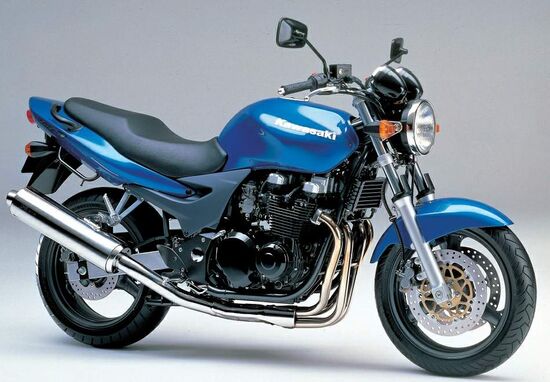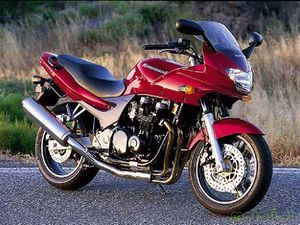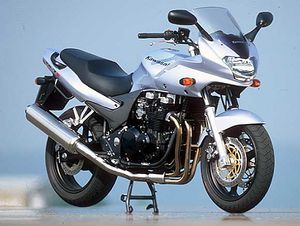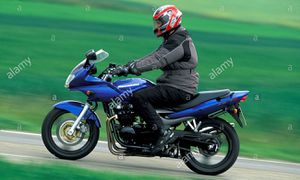Kawasaki ZR-7 was first introduced in 1998, and official sales began in 1999. The appearance of this motorcycle was due to Kawasaki's desire to update the obsolete archaic classic model Kawasaki Zephyr 750 and offer the market is essentially the same Zephyr 750, but wrapped in a modern "street". However, the Kawasaki ZR-7 lasted only 6 years before being replaced by the modern naked Kawasaki Z750.
The motorcycle was targeted at the markets of Japan, Europe and North America.
The Kawasaki ZR-7 was based on the same engine as the Kawasaki Zephyr 750 with minimal differences. The main changes concerned mainly the intake system - in particular, throttle sensors (K-TRICK system) appeared, which made it possible to increase power by 5 hp. and a torque of 4 Nm. The appearance of the engine, the system of oil channels and the camshaft beds were also slightly changed. Recent improvements have led to a noticeable reduction in engine noise, but oil consumption can still occur, as in Zephyr 750.
The Kawasaki ZR-7 engine is a 738cc, in-line, 8-valve, 4-cylinder, air / oil cooling unit. see, delivering up to 76 hp. power and 63 Nm of torque. The motor is tuned for firm traction from low and medium revs, showing maximum performance at 7500-9500 rpm and damping quite quickly closer to the upper range of work.
The main modifications of the Kawasaki ZR-7:
- Kawasaki ZR-7 - classic version with round headlight. It was available from 1999 to 2003.
- Kawasaki ZR-7S - a version with a front fairing and more modern optics. It appeared in 2001 and was produced until 2005 inclusive.
The main competitors of the Kawasaki ZR-7 in the class:
Photos
Specifications
Specifications Kawasaki ZR-7:
| Model | Kawasaki ZR-7 |
|---|---|
| Motorcycle type | road (street, naked) |
| Release year | 1999-2005 |
| Frame | steel tubular |
| Engine type | 4-cylinder, 4-stroke, in-line |
| Working volume | 738 cm³ |
| Bore / Stroke | 66.0 x 54.0 mm |
| Compression ratio | 9.5: 1 |
| Cooling | air |
| Number of valves per cylinder | DOHC, 2 valves per cylinder |
| Fuel supply system | carburetor, 4x Keihin CVK32 (with K-TRICK - Throttle Response Ignition Control) |
| Ignition type | digital |
| Maximum power | 76.0 h.p. (56.0 kW) @ 9500 rpm - ZR-7, ZR-7S (Europe, North America)
72.0 h.p. (53.0 kW) at 9500 rpm - ZR-7, ZR-7S 2002-2003 (Japan) 67.0 h.p. (49.0 kW) @ 9000 rpm - ZR-7S 2003-2005 (Japan) |
| Maximum torque | 63.0 Nm (6.4 kg * m) @ 7500 rpm - ZR-7, ZR-7S (Europe, North America)
61.0 Nm (6.2 kg * m) @ 7500 rpm - ZR-7, ZR-7S 2002-2003 (Japan) 57.0 Nm (5.8 kg * m) @ 7500 rpm - ZR-7S 2003-2005 (Japan) |
| Gearbox | 5-speed |
| Drive type | chain |
| Front tire size | 120 / 70ZR-17 (58W) |
| Rear tire size | 160 / 60ZR-17 (69W) |
| Front brakes | 2 discs, 300mm, 2-piston calipers |
| Rear brakes | 1 disc, 240 mm, 2-piston caliper |
| Front suspension | 41mm telescopic fork (adjustable), 130mm travel |
| Rear suspension | linkage Uni-trak with monoshock (adjustable preload and rebound damping), stroke - 130 mm |
| Motorcycle length | 2105 mm |
| Motorcycle width | 755 mm - ZR-7
785 mm - ZR-7S |
| Motorcycle height | 1075 mm - ZR-7
1215 mm - ZR-7S |
| Wheelbase | 1450 mm |
| Saddle height | 800 mm |
| Minimum ground clearance | 130 mm |
| Acceleration to 100 km / h | 4.08 sec |
| Maximum speed | 201 km / h |
| Fuel tank capacity | 22.0 l |
| Motorcycle weight (dry) | 203 kg - ZR-7
209 kg - ZR-7S |
Documentation



